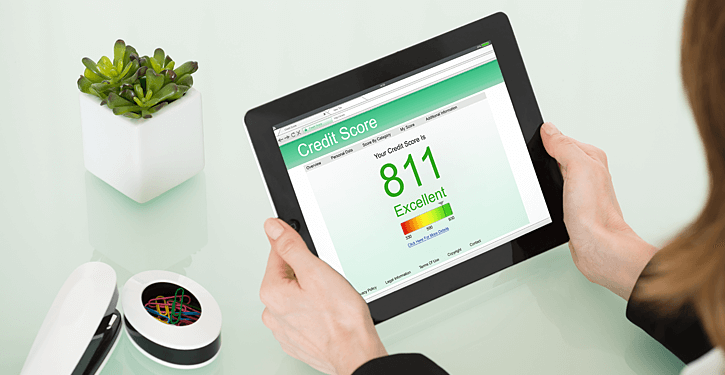Like stepping on the bathroom scale after too many holiday parties, checking your credit score after the holiday season could reveal a number you didn’t want to see. We can’t help you with your waistline, but we’ve got tips to help get your credit back in fighting shape.
Top 3 harmful credit habits during the holiday shopping season

Understanding where you slipped during the holidays is the first step toward a financial recovery plan.
1. You overspent
Overspending is the first and most common mistake people make over the holidays. Credit Sesame surveyed 500 consumers before the holiday season was in full swing. Our results showed that most people want to be frugal this year. The trouble was that 40% admitted they don’t set a holiday budget, and 20% blew their budgets in past years. Without a clear idea of how you’ll stick to your spending goals, you could end up spending more than you’d planned. Now your bills have packed on some holiday bloat.
2. You opened too many new cards
Maybe you heard a choir of angels sing when the sales associate offered 10% off a larger-than-expected purchase just for signing up for their card. True, store credit cards often come with promotional offers that save you money in the short term. But you’ve undoubtedly signed up for high interest rates and penalties if you don’t pay off your splurge on time. Carry a balance and that 10% savings will melt like a springtime snowman. What’s more, opening multiple cards in a short timeframe makes your credit score take a dip, and we don’t mean veggie dip.
3. You took security risks with your card
If you lose your card in a store, you call the issuer right away to freeze the account and send you a new card. Shopping online can also put you at risk. Online security breaches can be harder to spot at first because the card’s still in your hand.
One common scam landed in my inbox last week. I got an email saying my credit card purchase of $8,000 was being processed, including a link in case I wanted to modify my order. I saw telltale signs that the email wasn’t legitimate, like vagueness (what did I order and which card?). Still, the fear of losing so much money creates the temptation to click the link and cancel the so-called order. Don’t fall for it. Clicking the link will inevitably install malware on your computer or lead you to a copycat site to trick you into revealing credit card information.
Other risky online shopping practices include shopping with a debit card (your liability for fraud might be greater than it is when you shop with a credit card) and allowing the site to save your credit card information. It’s safer to type passwords and credit card numbers every time. Plus, the extra time and labor involved in typing out your information can help deter you from impulse purchases.
How to tell if your credit score has dropped after holiday splurge

How to check your credit score
You’re entitled to a free credit report from the three major credit bureaus (Experian, Equifax and TransUnion) once a year from AnnualCreditReport.com. Get them. You can keep a better eye on your credit over time if you request your credit report from one bureau every four months.
Your free reports don’t come with a free credit score. Visit CreditSesame.com for that. You may also have access to a free credit score from your bank or credit card issuer, and there’s no harm in viewing all of them. That’s because there are many different versions of your score, and although the reporting agencies each maintain data in your file, the agencies might not all have the same data so the scores can vary.
Credit Sesame will also provide you with a free credit report card, information about the factors contributing to your score, and specific suggestions for improvement.
Check the information in your credit reports carefully, and report inaccurate entries so the reporting agency can correct any mistakes.
How long does it take for credit score to drop?
Your credit score is a snapshot of the moment it is calculated. That means if you apply for a new credit card, the inquiry will immediately cause your score to dip by a few points. That said, you can also raise your score fairly quickly by practicing good credit behavior. If you pay off a credit card balance, your score should improve the moment the new, lower balance is reported to the credit bureau calculating the score.
How to place a fraud alert or freeze report
If your credit information has been compromised, act fast. Contact any one of the three major credit card bureaus. Report that you’re a victim of identity theft and ask to place a fraud alert on your file. The bureau you call must contact the other two as well, but confirm this while you have them on the line. The fraud alert will stay on your report for 90 days, after which you can renew it if needed.
To lock down your credit long term, request a credit freeze. This restricts access to your credit report by anyone other than you and the institutions you already do business with (collections agencies and courts can still access your file). You can still apply for things like jobs, apartments, and insurance, but you’ll need to temporarily lift the freeze to provide access for the people who need it, such as when you apply for credit. Neither a credit freeze nor a fraud alert hurts your credit score, but a freeze/thaw may incur a fee.
Better credit habits for the New Year

Don’t panic. A less-than-stellar credit score right now doesn’t mean doom in 2017. Here’s how to implement some better habits in the New Year.
Should I cancel my store credit cards?
Our first impulse when we make a mistake is to undo it as quickly as possible. That’s not always the best idea with credit cards. Closing accounts can cause a dip in your credit score if you carry a balance on one or more other cards (because losing the credit limit on the closed card will hurt your utilization ratio). If you opened too many cards, step one is to pay the bills, on time, and in full if possible. If the balance is too high to pay off right away, concentrate first on the cards with the highest interest rates.
If you don’t carry any balances, closing a card won’t hurt you in the short term. Part of your score, though, is based on the average age of all of your accounts. An account closed in good standing stays on your credit report for another ten years, and is then removed. To preserve the longest possible average account age, leave the oldest card(s) open and close the newer accounts.
Best budgeting tools for 2017
Setting a budget is critical to avoid overspending and to have a smart game plan for paying off your credit card debt. A few excellent apps to try include:
- Mint. This free app connects to all of your financial accounts and creates a personalized budget based on your spending habits. You get customized tips and alerts about unusual charges.
- You Need a Budget. Rules like “Give every dollar a job” and “Embrace your true expenses” are great for budget newbies. YNAB offers a 34-day free trial and costs $50 per year after that.
- Unsplurge. Guilt-free splurges start with great savings habits. This free app tracks your progress towards goals like a fun vacation.
- Level Money. The app shows you how much money is left after factoring in essentials like rent, bills, and savings. It’s a free way to see how much you can afford to spend on a daily, weekly, or monthly basis.
Best way to monitor credit score
Credit Sesame’s free credit report cards are a useful tool to monitor how your habits affect your score. Some credit cards also offer credit scorecards to help you monitor your credit progress. And again, get those free credit reports each time you’re eligible so that you can track your progress and watch for fraud.
How soon will my credit score go up?
How quickly your credit score changes will depend on your credit habits and your starting point. People with lower scores often see changes within just a few billing cycles if their credit behavior changes dramatically enough.
One of the best ways to affect your score is to commit to paying the full balance on your cards, on time, every time. Reducing maxed-out balances to zero feels like throwing rocks out of a hot air balloon. The more you pay off, and the quicker you can do it, the bigger of an impact you can make on your credit. Marking your calendar is important, too. Even one late or missed payment can affect your credit. A few months of flawless credit habits can help put you in position for a bright 2017.





















